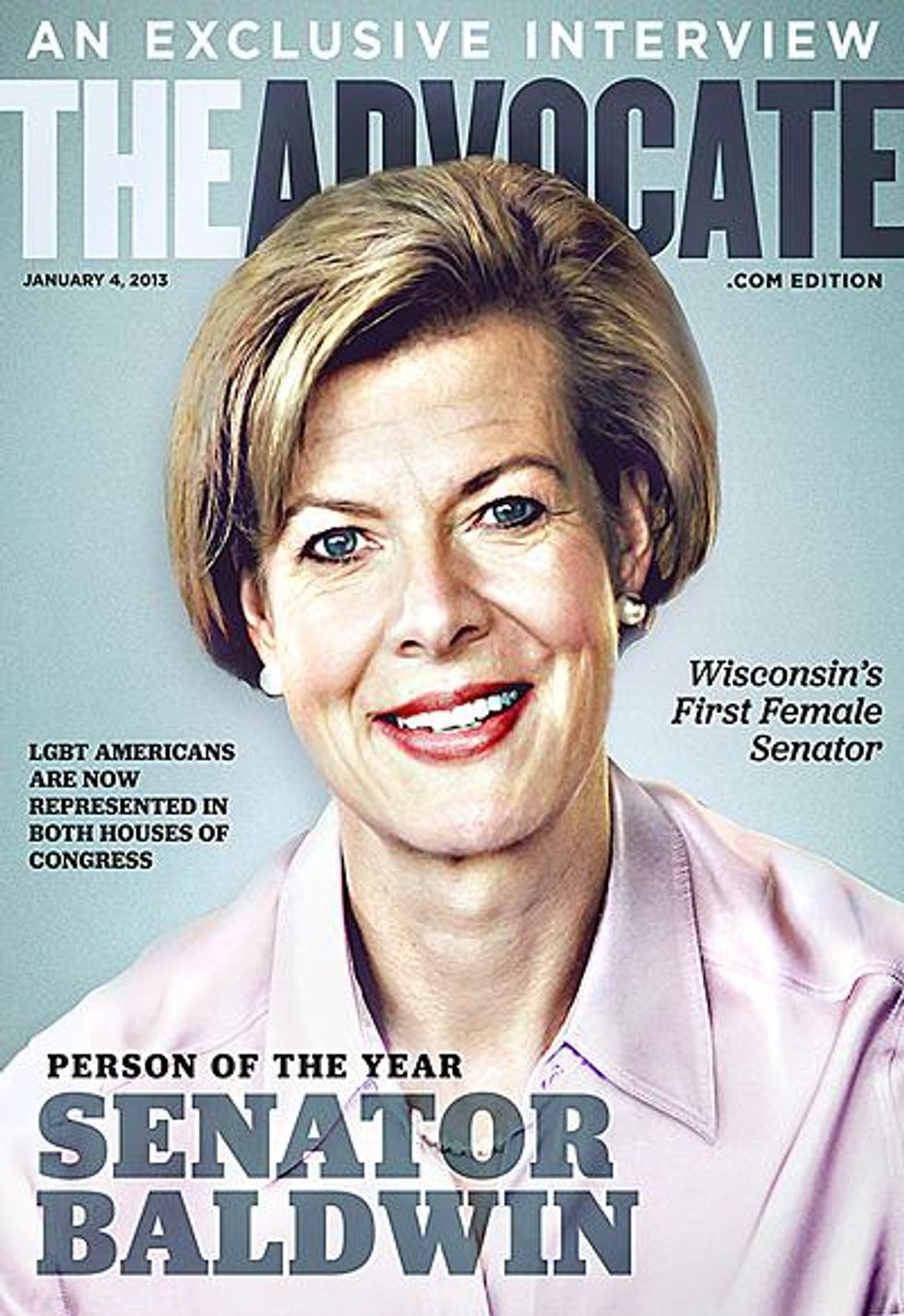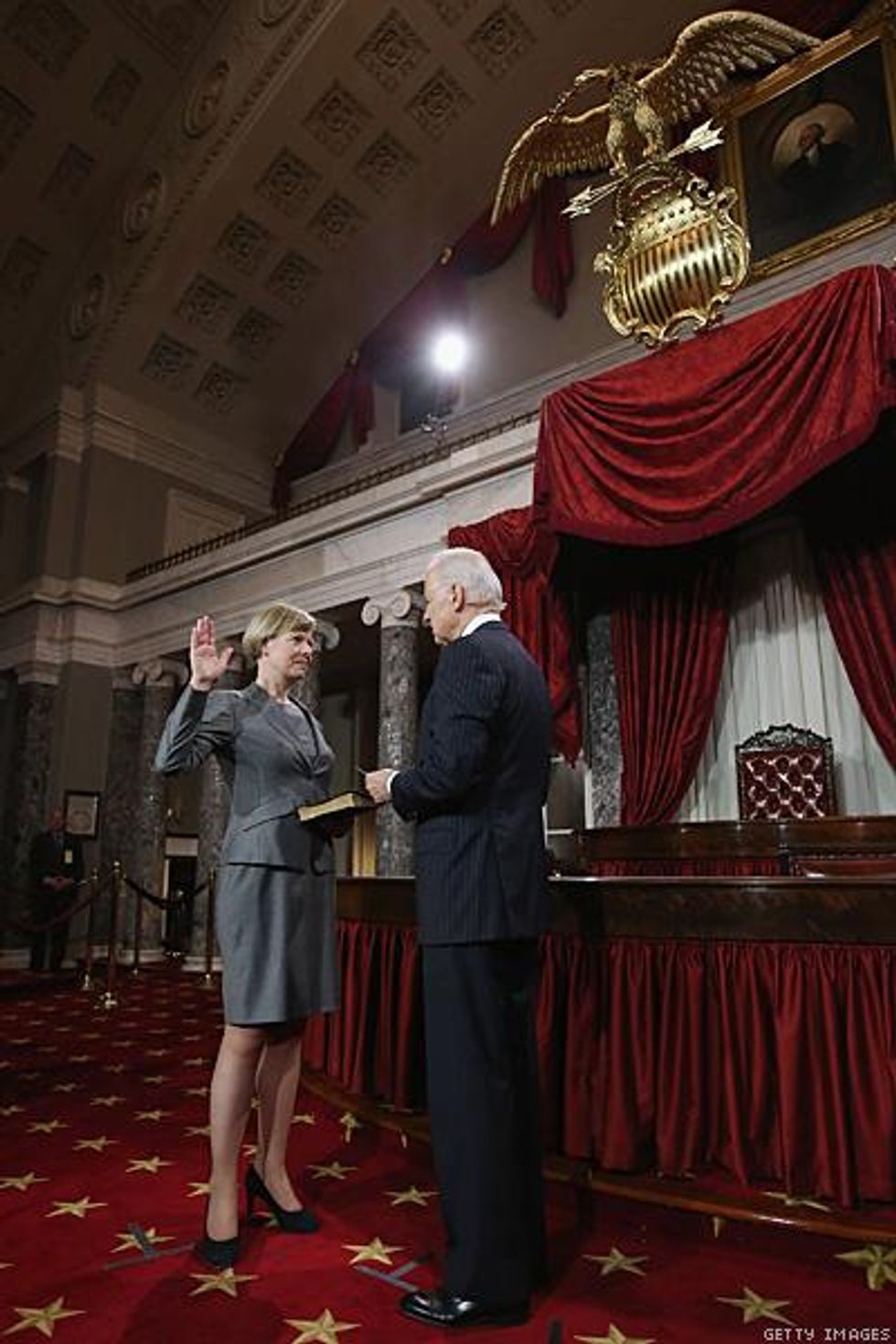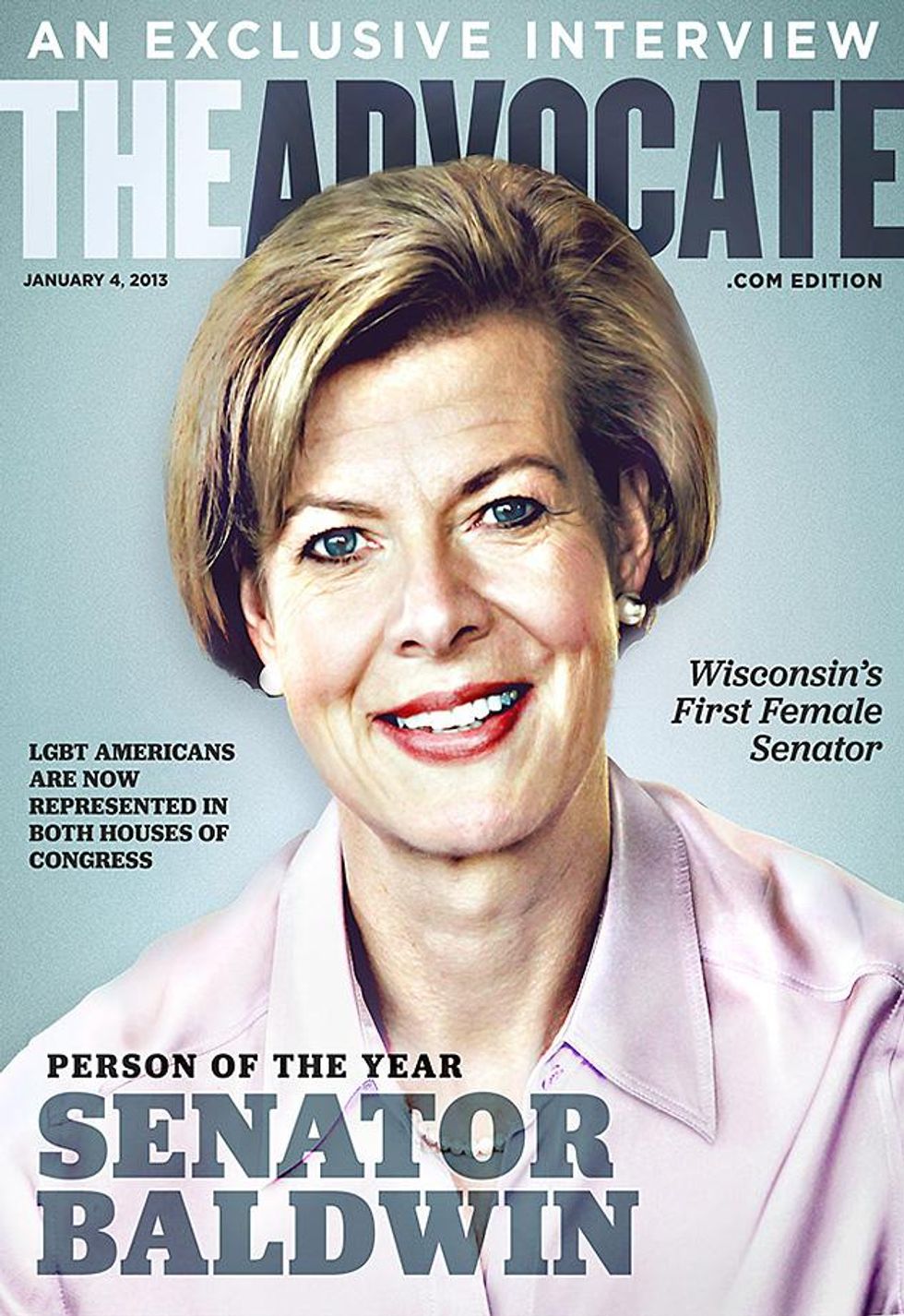
"I remember watching the Democratic convention and her giving her speech and thinking to myself, I can aspire to anything. There's no limits anymore," she says.
Baldwin, who was sworn in Thursday as the first openly gay U.S. senator, says she hopes her own achievement will have a similar "ripple effect." Speaking with The Advocate in her first interview of the new year, she notes that LGBT people have already told her, "This has changed me in some way," when talking about her win.
"At every glass ceiling I've broken, I've hoped that that's the message that goes out so loudly and clearly," she says. "This is a message that we don't have to limit our aspirations in this society anymore."
From her election to the Dane County Board of Supervisors at age 24 to her service in the Wisconsin State Assembly to her election as the first openly gay nonincumbent in the U.S. House of Representatives in 1998, Baldwin, now 50, has always been a trailblazer. Now, with her seat in the U.S. Senate, the granddaughter of the head costume designer for the University of Wisconsin's theater department moves to her most visible stage to date in what has been called the "world's most exclusive club." She joins the Senate as the freshman member with the most seniority.
"If you're not in the room, the conversation is about you, even if you have a lot of allies there," she says. "If you're in the room, the conversation is with you, and that makes a huge and transformative difference."
As Baldwin said in her victory speech on election night, she is "well aware" of being the first openly gay senator and the first woman to represent her state in the chamber. However, neither of those details dominated the hard-fought, closely watched contest that pitted the solidly progressive seven-term congresswoman against Tommy Thompson, the former four-term Republican governor and Bush Cabinet secretary.
Voters she met on the campaign trail "almost never" raised the issue of her sexual orientation, she says. The election focused on the struggles facing Wisconsinites, especially on the economic front, and Baldwin pitched herself as a "fighter" who would represent the middle class in Washington.
"The campaign wasn't about me. It wasn't about Tammy Baldwin. It wasn't about Tammy versus Tommy, even though at some points it seemed to become that," she says. "It was about the epic challenges facing this nation."
Outside groups including the Gay and Lesbian Victory Fund, LPAC, and EMILY's List endorsed Baldwin and spoke more explicitly about the history-making nature of her bid. Their support provided reinforcement on the few occasions when opponents launched personal attacks.
Early in the campaign, a candidate for the Republican nomination sent out a fund-raising appeal that deemed her a "radical leftist" who had "led the fight to redefine marriage to include same-sex pairings." During the general election, a Thompson staffer circulated a video clip of Baldwin dancing at a pride event with a sarcastic message about her "heartland values." Neither tactic worked to their advantage.
"It either had no impact or backfired for the two candidates whose campaigns chose to make an issue of this," she says. "[Voters] didn't want to be distracted. They wanted to ascertain who was going to be for them."
Compared to voters, Baldwin said the media represented one layer of the campaign where her sexual orientation was discussed "very consistently." Journalists inevitably asked a question in interviews, often about whether she thought voters were ready to support a lesbian for public office, or if she believed her sexual orientation could be an asset in the campaign.
"If anyone on the campaign was likely to raise the issue, it was typically a journalist," she says.
While not a staple of her stump speech, Baldwin acknowledges that her identity as a woman and a lesbian will be one of the essential perspectives she brings to the Senate. That lens will influence her approach not only to LGBT-specific items but also to policy conversations in general.
"We all know that having a seat at the table matters on a very substantive level, because each of us brings our life experiences with us to our jobs," she says. "It's not like a coat check where you check your life experience at the door and walk in and do your job and pick it up on the way out. You always have that with you, and it informs the way you approach a debate, the way you decide how to vote, and your participation in the conversation."
 Left: U.S. senator Tammy Baldwin participates in a reenacted swearing-in with Vice President Joe Biden in the Old Senate Chamber at the U.S. Capitol Thursday in Washington, D.C.
Left: U.S. senator Tammy Baldwin participates in a reenacted swearing-in with Vice President Joe Biden in the Old Senate Chamber at the U.S. Capitol Thursday in Washington, D.C.
Baldwin asked the Senate's Democratic leadership for committee assignments that would allow her to best serve her Wisconsin constituents while applying expertise and interests she nurtured in the House, such as in the health and human services areas. She says she's "thrilled" with her assignments, which include posts on the Health, Education, Labor, and Pensions Committee; the Homeland Security and Governmental Affairs Committee; the Special Committee on Aging; and the Budget Committee.
As the 113th Congress opens, Baldwin lists a mix of long-standing and more recent LGBT priorities on which she plans to play a leading role. In the Senate she will be part of the majority party, which improves her chances of advancing the agenda.
Marriage equality will continue to receive considerable attention this year with the Supreme Court set to hear challenges to the Defense of Marriage Act and Proposition 8, the California marriage ban. Legislation to repeal DOMA passed the Senate Judiciary Committee in 2011 but has yet to receive a hearing in the House, where the Republican majority continues to finance the court defense of the 1996 law. A total of three Republicans had signed on to cosponsor the repeal measure, known as the Respect for Marriage Act, by the close of the 112th Congress, but the bill will need to be reintroduced in the new session.
Baldwin says she expects proponents of repeal to engage in "careful coordination and communication" with the Supreme Court litigants. Some legal scholars have expressed concern that legislative action could bolster DOMA defenders, who argue that LGBT people are politically powerful and do not need the court to intervene on their behalf.
"One thing I would certainly push strenuously is early introduction of both the repeal bill in the House and the Senate and every effort possible to have a growing number of cosponsors that signal clear additional support in the direction of repeal of the Defense of Marriage Act," she says.
The new session offers an opportunity for "bold action" in the Senate on an inclusive Employment Non-Discrimination Act with protections against discrimination based on sexual orientation and gender identity, while the climate appears "very ripe" for laying more groundwork in the House, Baldwin says. Although she will have to step down from the LGBT Equality Caucus she cofounded with former congressman Barney Frank of Massachusetts in 2008, she hopes the group, which has expanded to more than 100 House members, continues its work on ENDA.
"A lot of education still needs to go on," she says. "I hope they grow that stronger but use it as the very strong vehicle it has been to educate on Capitol Hill, to provide briefings to make sure people still recognize the very significant need for this legislation in the areas of the country where there are no legal protections for people in the LGBT community."
While the Senate Health, Education, Labor, and Pensions Committee holds jurisdiction over ENDA, another of Baldwin's assignments, the Homeland Security and Government Affairs Committee, oversees the Domestic Partnership Benefits and Obligations Act, which she also lists as a priority. The legislation would extend benefits to the same-sex partners of federal employees, which remains relevant as long as the fight for marriage equality continues.
Baldwin also sees prospects for antibullying legislation, "perhaps as an element of a broader education bill," even with the House under control of a "majority of anti-equality Republicans."
"That's going to be an impediment to passing bills from both houses and getting them to the president's desk," she says. "That said, this might be one where we can get something through the House, and we're going to push to make that happen. I plan to be working very closely with the sponsors in each house on that."
The House now includes six openly LGBT representatives, a record high number. Baldwin, whose experience encompasses the passage of the Matthew Shepard and James Byrd, Jr. Hate Crimes Prevention Act and "don't ask, don't tell" repeal, looks forward to sharing lessons from the trenches with the group, which includes four freshmen. One of the new members, Rep. Mark Pocan, won her former seat in Madison and made Wisconsin the first state with two openly gay members of Congress.
"The newcomers have a huge learning curve ahead of themselves but also are all leaders already in their own rights, and I certainly see myself helping to mentor them to the extent that one can do so from across the Capitol," she says.
As the first openly gay senator, Baldwin can be relied on by media as a voice for LGBT Americans. Not every elected official embraces the work of spokesperson or role model, but Baldwin views the Senate's more prominent platform as a chief asset. She says the "gradual" trajectory of her 25-year political career, from local to state and federal office, helps reduce the pressure that would seem to come with the higher profile.
"It's a more visible accomplishment, more people are aware of it, but because it's happened gradually, I think it makes it easier to keep it real," she says. "I'm just a person. I'm just a woman from Madison."
















